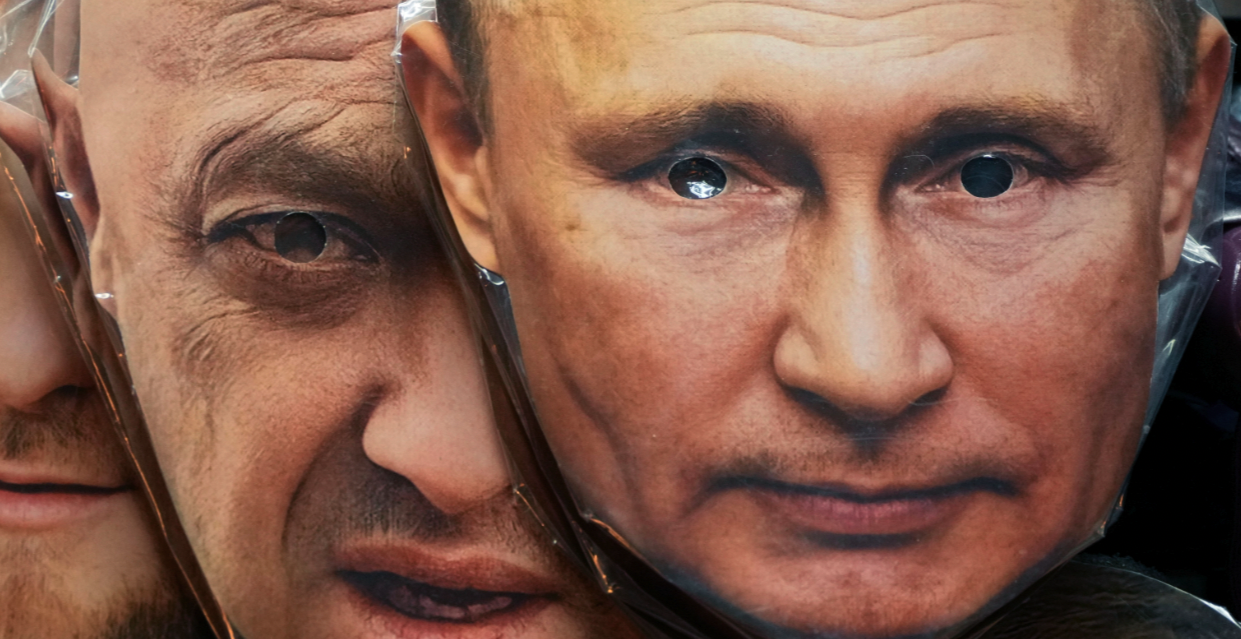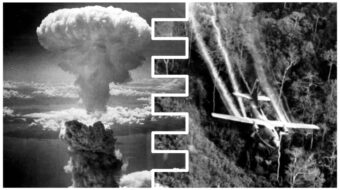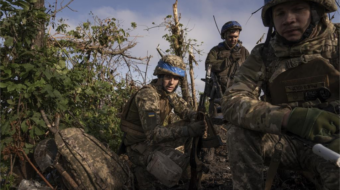
Warring armies in Russia, although they’ve stepped back for now, are dangerous for all of us, given that it’s a country with perhaps half the nuclear arms in the world. Any sober analyst of the situation would say this is precisely the wrong time to call for more weapons to be sent in to further fuel the fire already raging in Ukraine.
Yet that is precisely what many officials in the U.S., along with the top military leaders of NATO, are suggesting. All day Sunday, the cable TV talking heads—among them former and present generals and the top military figures in NATO, which is preparing for a summit next week—called for seizing this moment of perceived weakness of Putin. They urged pouring into Ukraine all the missiles and warplanes it wants in order to take advantage of Russia’s alleged fragility.
When one analyst on MSNBC suggested this might not be the best time to inflame tensions with more arms, former U.S. Ambassador to Ukraine William Taylor responded forcefully, “No, no, no. Send it all in, and give them [the Ukrainians] what they need to also go in and attack Crimea.” NATO Secretary General Jens Stoltenberg also hinted it could be the right time for Ukraine to reverse Russia’s “illegal annexation of Crimea.”

The latest crisis in Russia began on Friday when mercenary boss Yevgeny Prigozhin—whose Wagner Group private army troops bore the brunt of the fighting in the Ukrainian city of Bahkmut—began a march into Russian territory, heading for Moscow.
Prigozhin raged about what he said were attacks on his troops by Russian regular army forces. He said his armed uprising was aimed at forcing the resignation of Russian Defense Minister Sergei Shoigu. He also declared that the top generals in the Ministry of Defense were to blame for urging Putin to start the war in the first place.
Then, almost as suddenly as Prigozhin’s coup started, it fizzled—leaving some in the corporate-owned media disappointed. Some 120 miles outside of Moscow, his army of 25,000 halted its advance and, after a mysterious deal he struck with Putin, Prigozhin disappeared from the scene, saying he was heading for Belarus. Unconfirmed reports put him at a Minsk hotel on Sunday evening.
The media reported the agreement was brokered by Alexander Lukashenko, President of Belarus, who, until now, never really impressed many observers as much of a diplomat. It is just as likely that Putin himself struck the deal, with his ally in Belarus playing his assigned role.
Putin, too, disappeared from public view after the deal. Before striking a bargain with Prigozhin, however, the Russian president had accused his hired gun of “mutiny” and “treason.” He falsely compared Prigozhin’s coup attempt to the Russian Revolution of 1917 which overthrew the Czar and replaced the Russian Empire with a socialist state. A mutiny by a capitalist military mercenary is in no way comparable to that democratic revolution, which was led by workers and peasants.
With the agreement between Putin and Prigozhin—whatever its terms may be—the shedding of blood on the streets of Moscow was avoided for now, and the Russian people generally breathed a sigh of relief.
On Sunday, while Western media were portraying the uprising as the “biggest crisis in Russia since…1917,” life in Moscow generally carried on as usual. The roadblocks and closures of the previous day were gone, the army’s machine gun emplacements were dismantled, and the mayor announced the “counterterrorism regime” he had declared in preparation of Prigozhin’s anticipated arrival was over.
Some couldn’t stop themselves from urging on the continuation of the crisis, though. U.S. Secretary of State Antony Blinken described the weekend’s events as “extraordinary” and recalled that 16 months ago Russian forces were poised to seize the capital of Ukraine but now Putin had to defend Moscow from forces led by his onetime protege.
“I think we’ve seen more cracks emerge in the Russian façade,” Blinken said on NBC’s Meet the Press. “It is too soon to tell exactly where they go and when they get there, but certainly we have all sorts of new questions that Putin is going to have to address in the weeks and months ahead.”
An interesting moment in the whole Prigozhin coup crisis was the striking similarity of the appeals made to Russian troops by the mercenary and by Ukrainian President Volodymyr Zelensky. During his march to Moscow, Prigozhin told Russian soldiers on radio, television, and social media that their own generals were using them as cannon fodder and sending them none of the ammunition or food they needed to fight. Zelensky, who was born in eastern Ukraine and is of Russian background, spoke to the same troops in his native Russian language from a script almost identical to the speech Prigozhin had delivered only a short time earlier.
It is difficult at this point to know all the details of the rebellion and what truly motivated it. Some speculate Putin’s demand that mercenary companies sign contracts with the Defense Ministry by July 1 pushed Prigozhin to take action to save his private army from being absorbed by the Russian military. Others say he hoped to take advantage of supposedly low war morale among Russian troops and the public to actually seize power.
Regardless, the coup attempt didn’t generate much sympathy within the apparatus of the Russian state, as the Federal Security Services (FSB) immediately called for Prigozhin’s arrest.

The full background to the situation will only become clearer with time, but some things are already apparent. Prigozhin’s band marched hundreds of miles through Russian territory, passing many towns and villages. He garnered neither much support nor opposition along the way.
He picked up a few cheering crowds in Rostov-on-Don, with many running up to shake his hand. Zelensky said the reception “exposed the weakness of Putin’s regime,” and some Western news outlets said the scene “played into Putin’s fear of a popular uprising.”
What few reported, though, was that Rostov is home to a large Russian-speaking Ukrainian population, many of whom fled Ukraine amidst the anti-Russian violence stoked by right-wing forces and Ukrainian government troops from 2014 until the beginning of the Russian invasion last year. Many of them saw Prigozhin as a hero in the fight against their enemy, the Ukrainian army, in the towns from which they came. Few yet knew of his Wagner Group rebellion.
One man in Rostov, Sergei, told the Associated Press on Sunday he was glad the tension was over and said Wagner soldiers used to be heroes to him, but not now. Even former CIA director Gen. David Petraeus admitted, “This rebellion, although it had some applause along the way, didn’t appear to be generating the kind of support that he [Prigozhin] had hoped it would.”
At this early stage, it is of course impossible to know whether there has been any direct U.S. or CIA involvement in the crisis. Biden forcefully denied such a possibility on Monday morning, saying, “We had nothing to do with this.”
What is known, however, is that U.S. intelligence knew of Prigozhin’s plans for the rebellion at least a week before it happened. Anonymous sources have confirmed that U.S. intelligence saw him massing his troops for a departure, with their guns aimed toward Russia. Unlike their broadcasting of plans by Putin to invade Ukraine last year, the reporting of advance knowledge concerning Prigozhin’s armed uprising was nil.
There are indications that U.S. diplomats have used the crisis to try to pressure Saudi Arabia, Turkey, and China to change their position of neutrality on the war and come out in condemnation of Russia. It was hoped that with Putin looking weakened, some of those who advocated ceasefire and negotiations might switch positions. That effort failed, with each of these countries sticking to their neutral stances; China, in particular, went further, saying it will maintain its friendship with Russia.
It is also not clear that Russia’s economy has been particularly weakened, despite claims to the contrary. While NATO’s expansion to the east clearly helped generate the chaos inside Russia that it was intended to foment, the policies of sanctions against Moscow, overall, have not been successful. Despite the sanctions, the Russian economy continues to function, and the ruble has climbed back to where it was before the sanctions. In addition, Russia has been able to get China and India to drastically increase their purchases of Russian oil.
The one area in which the sanctions have been effective, however, is in making it much more difficult for Russia to replace its used-up or destroyed arms and aircraft. This is one of the main reasons the U.S. has put so much pressure on China not to supply Russia with military equipment.
Zelensky has claimed the Prigozhin crisis shows Russia is at the point where it is about to collapse. That rhetoric is part of his effort to lobby Western governments to dispatch more weapons to Ukraine, but it’s probably more wishful thinking than objective analysis.

Prigozhin’s relatively unopposed and rapid advance toward the Russian capital, however, does raise questions about the vulnerabilities of Russian security forces. It was reported that his mercenaries downed several Russian Air Force helicopters and a military communications plane. The coup attempt also resulted in some of the Kremlin’s most effective fighters being removed from the battlefield: both the Wagner Group forces and Chechen mercenaries sent to stop them.
For those who want to escalate the war in Ukraine, the current moment is being trumpeted as an opportunity—and some are seizing that chance. Already Monday morning, the European Union announced it was boosting its Ukraine military aid fund by another $3.8 billion (3.5 billion euros), bringing its total to more than $13 billion (12 billion euros). That’s on top of the billions in weapons already sent by the EU, along with the even higher amounts forked over by the U.S.
Pumping more weaponry into this conflict and attempting to engineer the destabilization of a nuclear-armed Russia could have repercussions way beyond just helping Ukraine win the war—repercussions too horrible to even contemplate. What this moment really demands is negotiations to end this war via an immediate ceasefire and negotiations—for the sake of the people of Ukraine, Russia, and the whole world.
As with all op-eds published by People’s World, this article reflects the opinions of its authors.
We hope you appreciated this article. At People’s World, we believe news and information should be free and accessible to all, but we need your help. Our journalism is free of corporate influence and paywalls because we are totally reader-supported. Only you, our readers and supporters, make this possible. If you enjoy reading People’s World and the stories we bring you, please support our work by donating or becoming a monthly sustainer today. Thank you!











